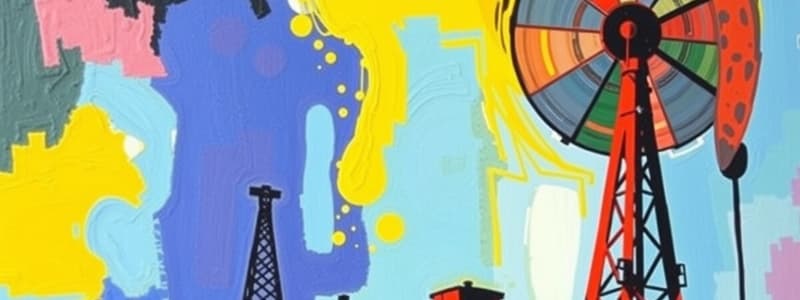Podcast
Questions and Answers
What event is referred to as the birth of the modern oil industry?
What event is referred to as the birth of the modern oil industry?
- The invention of the Christmas Tree device
- The oil gusher near Beaumont, Texas (correct)
- The discovery of oil in Pennsylvania
- The explosion of the Deepwater Horizon oil rig
What was the estimated financial loss from the uncontrolled flow of oil from the Beaumont well?
What was the estimated financial loss from the uncontrolled flow of oil from the Beaumont well?
- $17,000,000 (correct)
- $1,000,000
- $10,000,000
- $25,000,000
What percentage of the U.S. energy comes from non-renewable sources?
What percentage of the U.S. energy comes from non-renewable sources?
- 50%
- 93% (correct)
- 73%
- 98%
What was a major consequence of the BP Deepwater Horizon Oil Spill?
What was a major consequence of the BP Deepwater Horizon Oil Spill?
What was identified as a fundamental issue in the management of the Deepwater Horizon operation?
What was identified as a fundamental issue in the management of the Deepwater Horizon operation?
Flashcards are hidden until you start studying
Study Notes
Birth of the Modern Oil Industry
- The modern oil industry began on January 10, 1901, with a well near Beaumont, Texas.
- "Black Gold" erupted to heights exceeding 150 feet (approximately 50 meters).
- The uncontrolled flow lasted for 9 days, resulting in a loss of 1 million barrels of oil.
- A "Christmas Tree" device was invented to manage the flow of oil, now standard in the industry.
- Approximately 850,000 barrels were lost, equating to about $17 million today.
- This event led to a drastic drop in oil prices from $2 to $0.03 per barrel.
Impact on Energy Sources
- Over 400 wells were drilled in the Beaumont area within two years post-discovery.
- 93% of U.S. energy derives from non-renewable sources, heavily reliant on fossil fuels.
- Fossil fuels account for 79% of energy consumption, contributing to greenhouse gas emissions.
- By 2050, transitioning to renewable resources is critical to avoid severe climate-related losses.
- Transportation in the U.S. is 94% dependent on petroleum-based fuels, highlighting vulnerabilities to supply disruptions.
BP’s Deepwater Horizon Oil Spill
- The Deepwater Horizon spill, occurring in 2010, is the largest accidental marine oil spill.
- An explosion caused the oil rig to sink, with an uncontrolled gusher releasing oil for 87 days.
- The spill resulted in 4.9 million barrels of oil contaminating 665 miles of coastline.
- 57,539 square miles of Gulf waters remained closed to fishing due to contamination.
- The incident stemmed from defective well cementing linked to cost-cutting by BP, Transocean, and Halliburton.
- The situation revealed management flaws: "When everyone’s in charge, no one’s in charge."
- BP faced numerous criminal charges, resulting in billions of dollars in fines and liabilities.
- In 2014, a ruling held BP accountable for gross negligence, imposing further significant financial penalties.
- The spill emphasizes the severe consequences of negligence in industrial operations and environmental safety.
Studying That Suits You
Use AI to generate personalized quizzes and flashcards to suit your learning preferences.



